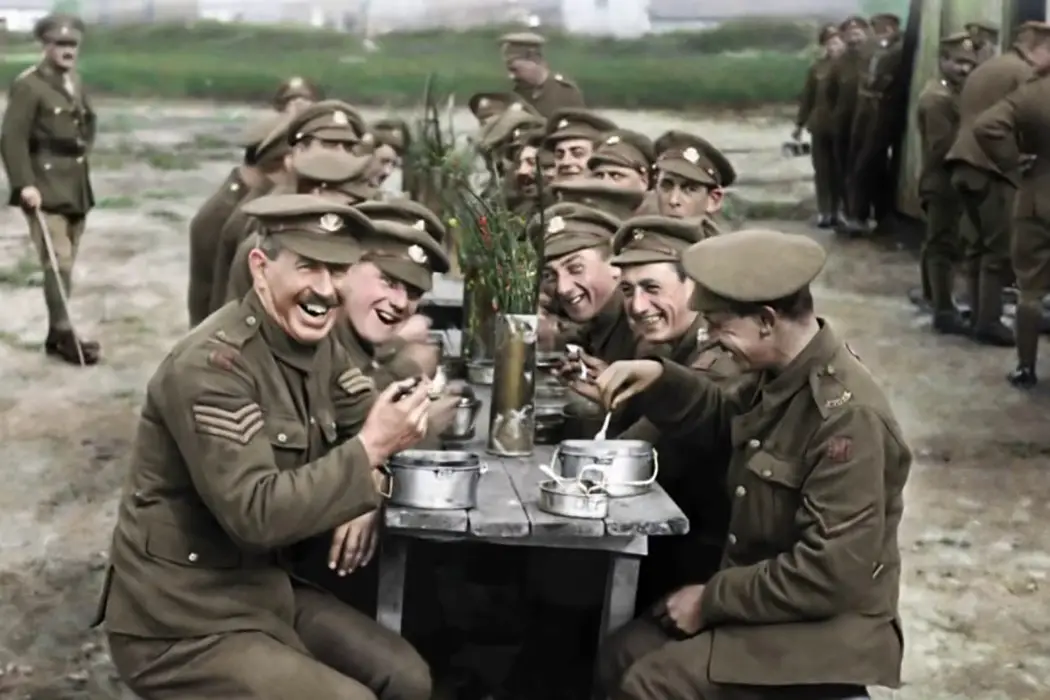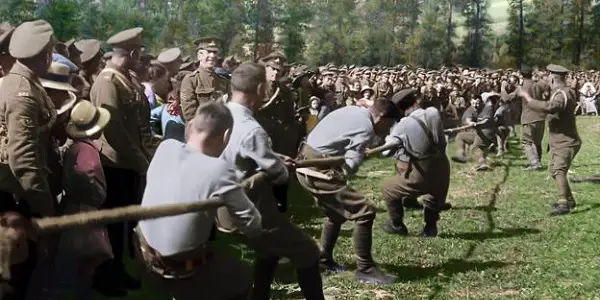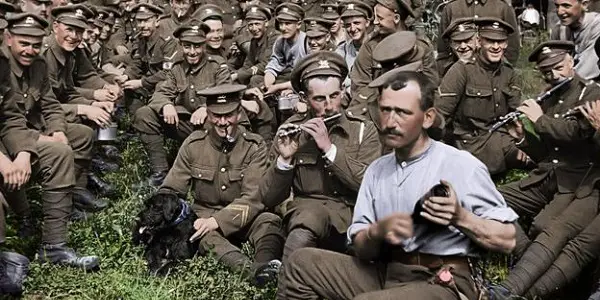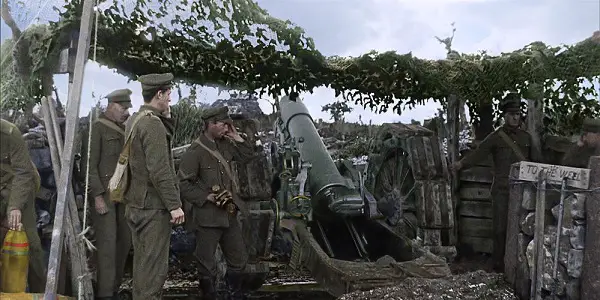THEY SHALL NOT GROW OLD: A Colossal Achievement Of Preserving History Through Film

Musanna Ahmed is a freelance film critic writing for Film…
It has been a century since the end of the First World War and to commemorate its history, Peter Jackson has crafted a work that will surely be remembered until at least the 200th anniversary. His colourised documentary They Shall Not Grow Old is a colossal achievement of preserving history through film, absorbing us with the experience of the British troops at the frontlines through the startling reproduction of image and sound.
Breathtaking visuals
Crafted by an amazingly talented team of archivists, colour grading artists, sound recordists, editors, and a director with a terrific vision, They Shall Not Grow Old fulfils its promise of bringing the Great War to life in a way never seen before.

The documentary opens with a shrunk and centred, black and white video of the soldiers relaxed and ready, whilst we hear voiceover of several veterans discussing their experiences at the beginning. They outline a brief history of their journey to the battlefield, as the screen slowly expands to full screen.
Once they’re on the frontlines, the colour morphs onto the screen and the transition is every bit as breathtaking as it was when first seen in the trailers. It should be noted that as a documentary for insight into the War, They Shall Not Grow Old isn’t particularly revelatory. Their insights are interesting if familiar, though an angle on their relationship with surrendering German soldiers is the most surprising, as is the tepid reaction to the close of the war. “I wouldn’t call it a whimper but it was something like that.”
Not a history lesson
As a cinematic experience though, it’s a startling view inside the trenches. Colourising the footage and implementing immersive audio reframes our knowledge of the war into something a lot closer to us, something that doesn’t feel so distant now. This includes viewing footage of soldiers in both the most intense moments (warning: graphic footage of dead, bloodied soldiers), but also their most mundane, like showing them line up on a log to take a dump into open ground, and listening to them speak about it in detail.

From a strictly filmmaking point of view, it sort of feels like a ‘director’s commentary’ wherein Jackson showed them the archive footage they obtained, and they gave vivid descriptions of what was going on in those clips, as opposed to them speaking of their personal feelings. This is the effect but obviously may not be the case since many (perhaps all) may have shared their experiences a long time ago and Jackson is using pre-recorded interviews.
In this sense, the words are more descriptive than analytical and the lack of individual personality for the narrating veterans – we never learn anything about who these speakers are, not even their names – may keep some viewers at arm’s length in emotionally engaging with the experience. Though, considering this, there are also plenty of times where the veterans recall something they saw with their own eyes and Jackson matches it with an appropriate shot. These moments are important in constructing the overall successful subjective experience. There’s enough footage to do all of this thanks to the incredible access and preservation by the BBC and Imperial War Museum. This is an empathetic tribute that humanises the nameless soldiers as a collective when it’s impossible to individually identify them all on camera.
Extraordinary audio work
The filmmakers can’t escape the trappings of extinct camera tech, so the missing details (such as the pupils of some eyes) are very noticeable. However, the remastering of the image resolution and astonishing work into transforming the footage from frame-rate 17 to 24fps bring the quality largely up to date. Likewise, the employment of 3D works fairly well in creating field of depth, a frame through a fence stands out in particular. What the team is able to completely build from the ground-up, though, is the sound.

Maybe the most fascinating behind-the-scenes featurette one could ask for is a look at how they recreated the soundscapes of the battlefield to a very palpable extent. The sounds of the bombings and gunfire are hellishly real, the screams of the combatants are frighteningly authentic. Jackson uses actors for ADR work, working with impressive lip-reading abilities, and their efforts are first-rate. Hearing what the soldiers are saying on-screen adds colour to the picture.
Conclusion: They Shall Not Grow Old
They Shall Not Grow Old is a major monument for our memory of the British soldiers who fought in WW1 and an enormous step forward in depicting history through cinema – since Peter Jackson loves trilogies, I’d love to see him remaster more archive footage of compelling history. This is a dignified tribute to those servicemen with an invaluable amount of work put in to make it a truly representational experience of life on the Western Front. It may not be the most informational work on the subject but this is certainly the most immersive audio-visual work ever produced about the First World War.
They Shall Not Grow Old is out now in UK cinemas. A release date is yet to be confirmed for the USA and other countries.
Does content like this matter to you?
Become a Member and support film journalism. Unlock access to all of Film Inquiry`s great articles. Join a community of like-minded readers who are passionate about cinema - get access to our private members Network, give back to independent filmmakers, and more.
Musanna Ahmed is a freelance film critic writing for Film Inquiry, The Movie Waffler and The Upcoming. His taste in film knows no boundaries.













